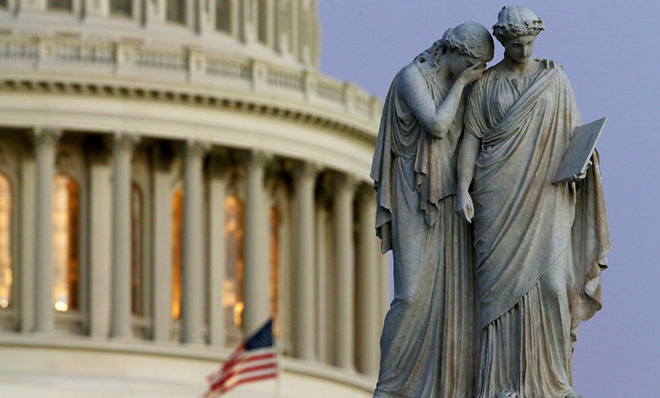The danger of taking for granted that America is a just society
If we permit injustice against some — which we most certainly do — we have no assurance we will always be judged worthy of justice ourselves


A free daily email with the biggest news stories of the day – and the best features from TheWeek.com
You are now subscribed
Your newsletter sign-up was successful
From Michael Brown to Eric Garner to the torture report, America has had a rough few weeks. It's become so bad that the fundamental idea of America, the one of pledges and anthems and declarations, is looking more like an insincere aspiration than it has for some time. Ours does not appear to be a particularly just society. And there is a danger in us clinging to the illusion that justice still reigns in America.
This is easy to write, but it's not nearly as easy to believe or truly accept. National myths persist precisely because they provide a bulwark against a difficult reality. More than that, though, to believe that in America outcomes do not reliably correspond with merit is, for anyone in a reasonably secure station or who has ascended to a higher station, to confess that our own status is at least in part arbitrary.
Our national reflex is to assume that when it comes to America, people generally get what they deserve. To assume otherwise brings into question both our national myth and the realness of our own status.
The Week
Escape your echo chamber. Get the facts behind the news, plus analysis from multiple perspectives.

Sign up for The Week's Free Newsletters
From our morning news briefing to a weekly Good News Newsletter, get the best of The Week delivered directly to your inbox.
From our morning news briefing to a weekly Good News Newsletter, get the best of The Week delivered directly to your inbox.
But make no mistake: Systematic injustice exists in America. We often rationalize or deny this with a two-step mental maneuver: First, we assume (in cases where it's not already obvious) that victims are Bad People. Second, we void the rights of Bad People so that whatever happened to them, we cannot say that it was in fact unjust. And thus, we maintain the national myth and relieve ourselves of any concern for the victims of injustice.
To wit: Despite some hand-wringing about the Senate Select Committee on Intelligence's torture report, many Americans still assume that whatever happened to detainees in the CIA's dungeons, they had it coming. According to a Washington Post poll, 71 percent of Americans support the use of torture even when the word "torture" is used in the question. That is to say, within very broad boundaries (the senselessness of Abu Ghraib being notably outside those boundaries), most people define American intelligence gathering as prima facie just.
Terrorists are Bad People — some of the worst. But if inherent human dignity, which we claim to uphold, means anything, then Bad People have it, too. But too many of us support treating Bad People as if they are not people at all. Further, we guilelessly trust the state to determine who is a Bad Person, and thus not worthy of our concern.
Now, all people throughout history have, to some degree or another, regarded their external enemies as less than fully human; it is understandable if not excusable. America's peculiar relationship with police violence, though, shows how this habit of mind marginalizes even our own citizens.
A free daily email with the biggest news stories of the day – and the best features from TheWeek.com
When we find out that a citizen has been harmed by an agent of the state, many of us assume the victim deserved it — that he could not have been a Good Person, otherwise he wouldn't have been in a situation to get shot or choked or beaten by the cops, who are definitely Good People. Again, both our national myth and our personal stature depend on this assumption. We grasp for justifications, and the media obliges by releasing criminal records and menacing photographs — neither of which tend to have much to do with the incident in question. And thus we are relieved: He was a Bad Person, so we need not fret over him. He, like the terrorist in a Bulgarian cell, has had his humanity voided.
The end result is blindness and contempt toward the poor and marginalized, whose circumstances make them the most likely to be the people whose deaths we find predictable, even acceptable. And we are not encouraged to alleviate their condition because Bad Things happen to Bad People — what are you going to do?
And so in our desperation to affirm the ideals at the heart of our national myth — justice, fairness, equality — we unwittingly sanction their destruction, whether in Staten Island or Kabul.
There's a particular difficulty here for conservatives. One of the first conservative commitments — one that is shared by most Americans regardless of party affiliation — is the maintaining of existing institutions and authority structures. But if we can't trust the police or the CIA, then what legitimate authorities can we trust?
The easy temptation is to prop up these institutions by ascribing to them an unrealistic moral authority. But now we abut another foundational conservative commitment: suspicion of power and limited government. If we assume, within a wide margin and barring extraordinary contradictory evidence, that the hammer of state power only falls on Bad People, then we are giving the state the authority to distinguish between Good People and Bad, and therefore between who counts in considerations of justice and who does not.
Who's out? Terrorists and "thugs." Who's a terrorist? Ask the CIA. Who's a thug? Ask the police. "Trust us; they deserved it."
Who's next? This is the uncomfortable question. For now, there's an implicit line at "potentially physically dangerous." How quickly that transforms to "economically dangerous" or "politically dangerous" is anybody's guess. Justice Scalia's jab in Windsor v. U.S. that the court had labeled social conservatives "hostes humani generis," or "enemies of mankind," should give that faction pause before endorsing too strenuously the moral authority of our government. But culture is fickle, and the HHG appellation may travel fast.
And, finally, who's in? The mainstream. The unthreatening. The compliant.
Most Americans can be safely nonchalant about grave injustices at home and overseas; after all, it's only Bad People who end up on the wrong side. But if we permit injustice against some, we have no assurance we will always be judged worthy of justice ourselves.
We can avoid this by remembering that our national myth is an aspiration, not a description, and that it requires hard work and even harder honesty, not thoughtless affirmation. Otherwise the myth will become nothing more than a wispy legend.
Brandon McGinley writes from Pittsburgh, where he works for the Pennsylvania Family Institute and lives with his wife and daughter. His writing has appeared in print in National Review, Fare Forward, and the Pittsburgh Post-Gazette, and online at First Things, Public Discourse, and The Federalist. He has edited a book on Catholic fatherhood, The Joys and Challenges of Family Life, to be published by Our Sunday Visitor in spring 2015.
-
 The ‘ravenous’ demand for Cornish minerals
The ‘ravenous’ demand for Cornish mineralsUnder the Radar Growing need for critical minerals to power tech has intensified ‘appetite’ for lithium, which could be a ‘huge boon’ for local economy
-
 Why are election experts taking Trump’s midterm threats seriously?
Why are election experts taking Trump’s midterm threats seriously?IN THE SPOTLIGHT As the president muses about polling place deployments and a centralized electoral system aimed at one-party control, lawmakers are taking this administration at its word
-
 ‘Restaurateurs have become millionaires’
‘Restaurateurs have become millionaires’Instant Opinion Opinion, comment and editorials of the day
